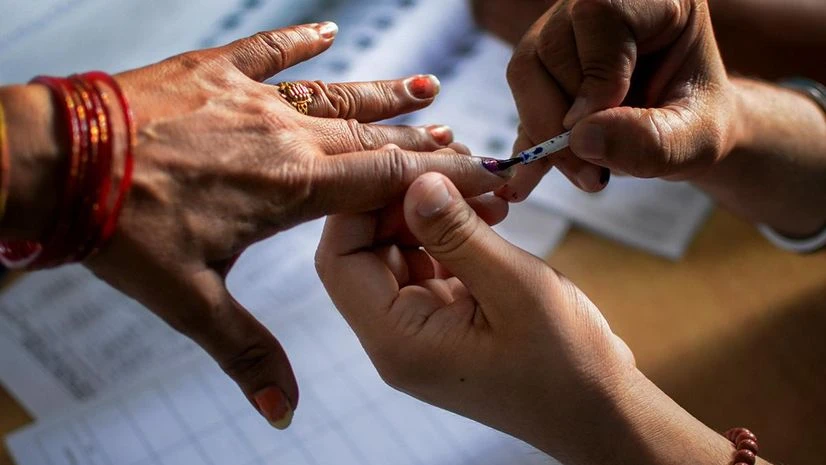Embroiled in an existential battle, the Left parties improved their performance marginally in the 2024 general election as they were heading towards victory on at least eight seats on Tuesday, even as their vote share did not increase significantly.
The Left parties were at their lowest in the 2019 Lok Sabha polls, when only three MPs from the Communist Party of India (Marxist) and two from the Communist Party of India could win their seats. Of those five seats, four -- two each of the CPI(M) and the CPI -- were in Tamil Nadu, while the CPI(M) also won a seat in Kerala.
The CPI(M), which fielded 52 candidates this time, was leading with comfortable margins on four seats, while a close contest was being witnessed on one seat in Kerala. Both the CPI and the CPI(ML) Liberation appeared headed towards victory on two seats each.
The CPI(M) sprung a surprise in Rajasthan, with its candidate from Sikar, Amra Ram, leading over his closest rival, Bharatiya Janata Party's (BJP) Sumedhanand Saraswati, by a margin of more than 70,000 votes.
In Tamil Nadu, the CPI(M) was headed towards victory on both the seats -- Madurai and Dindigul -- from which it had fielded candidates.
In Kerala, CPI-M's K Radhakrishnan was leading against Congress's Ramya Haridas by more than 19,000 votes from Alathur. A close contest was meanwhile witnessed in Attingal between the CPI-M's V Joy and the Congress's Adoor Prakash.
More From This Section
None of the Left parties could win any seat in West Bengal. Among the prominent candidates, CPI-M's Mohammad Salim was all set to lose the Murshidabad seat to Trinamool Congress's (TMC) Abu Taher Khan, who was leading by over 10,000 votes.
The CPI, which had fielded 30 candidates, won two seats in Tamil Nadu -- Tirupur and Nagapattinam -- maintaining its 2019 tally.
The Communist Party of India (Marxist-Leninist) Liberation was leading on two of the three seats it contested in Bihar.
In Arrah, Sudama Prasad of the CPI(ML) Liberation was leading against Union minister R K Singh of the BJP by more than 43,969 votes.
In Karakat, Raja Ram Singh of the CPI(ML) Liberation was leading against the NDA candidate, Upendra Kushwaha of the Rashtriya Lok Morcha, by around 7,000 votes. Expelled BJP member and Bhojpuri actor-singer Pawan Singh, who was in the third position here, turned out to be the NDA's nemesis.
As the trends emerged, CPI(M) general secretary Sitaram Yechury said it has now been proved that the exit polls were wrong.
"Trends have already proved that the exit polls were off the mark. Exit polls are designed more for the stock markets and for people to make money, but are totally out of sync with reality," he said.
CPI general secretary D Raja said the poll results show that the people of the country have rejected the BJP's aggressive campaign and its policies.
"The results show that an aggressive campaign by the prime minister has been rejected. People have rejected their policies," he said.
The Left parties' worst poll performance in six decades was in 2019, when the CPI(M) got only 1.75 per cent of the votes and the CPI got a little more than 0.5 per cent votes. This time, the vote share of the CPI(M) is around 1.78 per cent, while the CPI has secured a 0.5-per cent vote share and the CPI(ML) Liberation has got 0.19 per cent votes.
In the 1990s and 2000s, the Left parties maintained a steady place in India's electoral politics, even coming close to having a prime minister from the CPI(M) when the United Democratic Front (UDF) government was formed in 1996.
The CPI(M) won 32 seats in the 1996 general election, while the CPI had 12 MPs. In the UDF government that was formed as the Atal Bihari Vajpayee's 13-day government fell after failing to secure a majority, the name of then West Bengal chief minister Jyoti Basu came up for the prime minister's post. The CPI(M), however, declined the offer.
Many feel that was a blunder that cost the party dearly, eventually leading to a total decline.
The CPI(M) had maintained a vote share of more than 5 per cent from 1971 to 2009.
The oldest among the communist parties, CPI, got as high as 9.9 per cent votes in 1962, but started coming down post a split in the party that led to the creation of the CPI(M). It secured just over 5 per cent votes in 1967 and around 2.5 per cent in 1991.
The Left parties were at their electoral peak in 2004, when the CPI(M) sent 43 MPs to the Lok Sabha (with a 5.4-per cent vote share), the CPI sent 10 (with a 1.41-per cent vote share) and the All India Forward Bloc (AIFB) and Revolutionary Socialist Party (RSP) sent three MPs each.
In the 2009 Lok Sabha polls, the CPI(M) had a vote share of 5.33 per cent, but won only 16 seats, while the CPI won four seats with a 1.43-per cent vote share. The AIFB had also won two seats.
However, the decline of the Left parties was sharp between 2009 and 2019 as it lost West Bengal to the TMC in 2011, Tripura to the BJP in 2018, and in Kerala, where the Left Democratic Front (LDF) is in power at present, they could get only one seat in 2019.
In 2014, when the BJP came to power at the Centre, the CPI(M) had nine MPs and a 3.25-per cent vote share, while the CPI and the RSP had an MP each with a 0.78-per cent and 0.3 per cent vote share respectively.
(Only the headline and picture of this report may have been reworked by the Business Standard staff; the rest of the content is auto-generated from a syndicated feed.)

)
